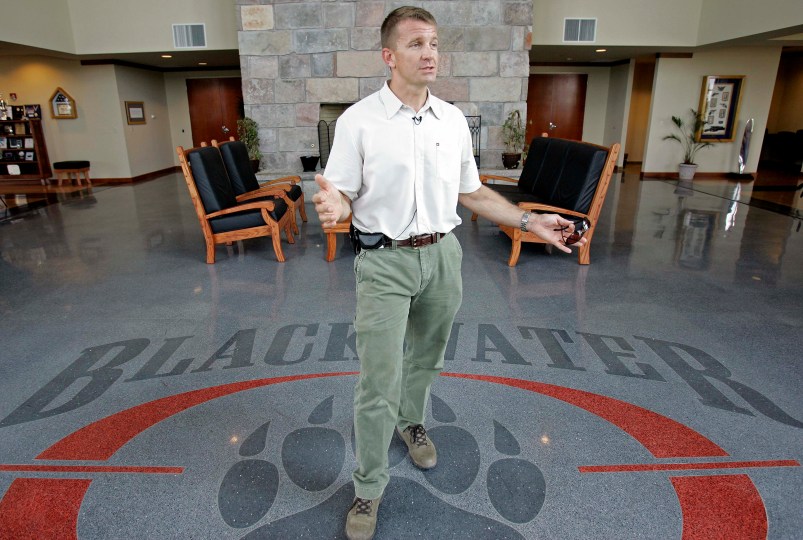The founder of the infamous private security contractor known as Blackwater thinks there have been several “dramatic misunderstandings” about his company, which has been accused of callously killing civilians in the Mideast.
In his new book “Civilian Warriors,” Erik Prince, who departed the company in 2010, makes it clear that he wants to debunk various “myths about Blackwater,” which is now known as ACADEMI.
TPM read Prince’s rebuttal this week. There are many things he thinks the world got wrong about his old company and its staff, who Prince describes as the “unsung heroes of the War on Terror.” But here are the top five:
1. Blackwater Uses Excessive Force
Prince does not dispute that Blackwater contractors were responsible for killing civilians while they provided security and support services for U.S. government agencies in the Middle East. However, throughout his book, he repeatedly rejected the notion his employees regularly used excessive force.
To back up this argument, Prince pointed to the case of Muntadhar al-Zeidi, the Iraqi journalist who threw his shoes at President George W. Bush during a 2008 press conference. Prince said al-Zeidi was tackled by a Blackwater contractor who was at the event providing security for a State Department official. He pointed to the fact the Blackwater staffer didn’t shoot al-Zeidi as evidence of his company’s restraint.
“Within an instant of the commotion, he had his department-approved pistol drawn, with a front sight picture of the assailant’s head, before the second shoe was thrown,” wrote Prince. “Yet, grasping the lack of a more significant threat — and the magnitude of shooting a man in a crowded room in front of two heads of state and an international press corps — Blackwater’s man reholstered his weapon, darted around the reporters, and brought the assailant to the ground.”
2. Killing A Dog At The New York Times’ Bureau
In 2007, a Blackwater bodyguard shot and killed a dog named Hentish in a compound that housed New York Times’ bureau in Baghdad. According to Prince, the incident was basically the dog’s fault.
“I was told the shooter, one of our K9 handlers, had been sweeping the newspaper’s area of the compound before a visit from U.S. embassy personnel, when Hentish — a feral canine that had come to rely on the table scraps reporters fed him — became territorial and attacked our bomb-sniffing dog,” wrote Prince. “After several attempts to separate the animals, and not wanting to see an extremely valuable Blackwater asset hurt by what amounted to a wild animal, the handler had no choice but to use his pistol to eliminate the threat.”
According to the New York Times’ deputy Baghdad bureau chief, the dog belonged to guards at a checkpoint on the compound and “grew up there from the time it was a puppy.”
3. Reckless Driving
One complaint often leveled against Blackwater’s contractors was that they drove through the areas they patrolled in a manner that posed risks to pedestrians and other drivers. In Iraq, Prince said aggressive driving was part of the operating procedures his company worked out with the State Department.
According to Prince, Blackwater was subject to a contract with state that was known as Worldwide Personal Protective Services, or WPPS for short. Prince said this contract dictated that American diplomats be driven “in gunned-up convoys of waxed SUVs” rather than more discreet vehicles to show they would not be “cowed” by Iraqi insurgents. Because of this, Prince said his men had to drive dangerously and sometimes shoot other vehicles to keep the highly visible convoys safe.
“So, yes, our motorcades sped through town, sometimes on the wrong side of the road. And absolutely, when hand signals or flashed lights didn’t get the attention of local drivers who pulled too close to our motorcades, Blackwater’s men threw water bottles at them,” Prince wrote. “There were times we had to follow that up by putting a few bullets into the intruding car’s hood, a tactic to stop the vehicle known as ‘shooting to disable.’ State demanded the appearance of American invincibility, but actually providing it meant getting their principals off the road as soon as possible.”
4. GOP Ties Helped Win Contracts
Prince is a six-figure Republican donor and former intern in President George H.W. Bush’s White House. His family also has extensive ties to conservative politicians and activists. Prince said his father, a wealthy businessman, “helped Gary Bauer and James Dobson launch the Family Research Council,” a conservative Christian lobbying group. Betsy DeVos, Prince’s sister, is a former chair of the Michigan Republican Party whose husband unsuccessfully ran for governor there in 2006 on the GOP line.
However, in the book, Prince disputes the notion his connections to Republicans helped him secure billions of dollars in government contracts and repeatedly points out Blackwater also worked for U.S. agencies during the Obama administration.
“Suggesting that my company’s billion-dollar growth was somehow tied to who my family votes for was lazy logic,” Prince wrote. “It wasn’t conservatism that somehow built my business. … U.S. agencies had repeatedly reached out to Blackwater with urgent needs, regardless of who sat in the Oval Office.”
5. Blackwater Was Secretive
To hear Prince tell it, he wanted to communicate with the public long before writing his book, but this was another instance in which restrictions imposed by the State Department made Blackwater look bad. Prince said Blackwater was obligated to abide by a “contractual nondisclosure policy” that was overseen by “a career bureaucrat” with “a fear of bad press that was extraordinary.”
“‘A Blackwater spokesman declined to comment’ soon became an incessant refrain in news stories,” wrote Prince. “Each time it appeared, my team … wanted to whip a computer against the wall.”






